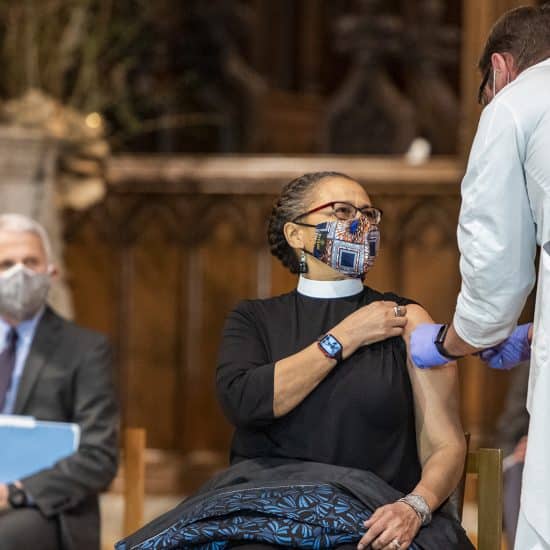Charles Chandler can joke about preachers suffering from “Superman syndrome” since he portrayed the “Man of Steel” when Metropolis, Ill., claimed the status as the superhero’s hometown.
The first “Superman” for the city’s annual celebration, Chandler, now director of the Ministering to Ministers Foundation, got to wear actor George Reeves’ costume from the hit 1950s television show, The Adventures of Superman. While the notoriety might have been a little heady, the appearance was not.
“You can’t imagine the humility it took… when I bounded upon the platform and saw half the congregation of First Baptist Church,” where he served as pastor at the time. “I was well aware that I wasn’t going to stop a bullet or a speeding locomotive or jump a building in a single bound,” he said.
Later, he received a note from a seminary student, suggesting Chandler might have an ego problem.

Even ministers must learn to lean on others from time to time.
|
While most ministers likely won’t have Chandler’s opportunity to play the part, often they fall into the Superman syndrome or develop a messiah complex — the belief that they “can fix things” for everyone and don’t need anyone’s help.
The requirement “to be strong in faith” develops almost from the beginning of ministry. “While it may never be explicitly communicated, ministers receive the message early on to ‘never let them see you sweat,’” explained David Hughes, recently retired pastor of First Baptist Church in Winston-Salem, N.C., and now executive director of the Transforming Center in Wheaton, Ill.
Pastors learn that they shouldn’t openly admit their needs. “Church members might question the depth of your relationship with God or the genuineness of your faith. Adversaries in the congregation might seize upon your ‘confessions’ as proof that you should be replaced,” Hughes said.
“Ministers conclude — sometimes correctly — that their churches are not ‘safe’ enough for sharing their needs with anyone.”
Hughes pointed to a recent Duke Divinity School study that claims ministerial “quiet desperation” has become epidemic.
“So we project a sense of well-being we do not feel. We become so skilled at playacting and going through the ‘ministerial motions’ that we lose touch with our true selves, allowing our false selves to project piety or courage or confidence — whatever seems to be needed at the moment,” he said.
Missouri native Bob Dale, an author and leader coach based in Richmond, Va., faced the “soul-seeing Answer Man” tag.
A “barely religious family member” asked Dale a couple of questions when he was a college student in the 1950s: Are you going to be a minister? What are you majoring in? Dale responded: “Yes. Psychology.”
“Then he stopped me in my tracks with four words: ‘What am I thinking?’ I was stunned, but he sat quietly and waited from me to read his mind,” Dale said.
“He had cast me as the religious equivalent of the self-reliant, all-powerful frontier lawman. It was both a scary and a heady moment. No wonder so many ministers evolve into the church boss or a Lone Ranger or a congregational know-it-all.”
Dale warned of viewing the ministry as “an individualized and isolated calling” because “that view…makes giving and receiving help extremely difficult.”
Self-esteem issues also can cause pastors to draw back from receiving ministry from others. “They believe that faith in God will solve all problems. If they admit their faults or needs, they feel it destroys the religious ideal,” Chandler explained.
Sometimes congregations contribute to the feeling of invincibility when they set their pastor on a pedestal, he added.
Pride in position at the church and within the community can contribute to ministers isolating themselves. Robert Creech, director of pastoral ministries studies at Baylor University’s Truett Theological Seminary, noted that, especially in the past, ministers often expected certain perks such as discounts or other considerations from businesses and individuals.
“The refusal to allow others to minister to the minister is more likely to be an act of pride than of humility, and is a denial of the congregation’s identity as the body of Christ,” Creech added.
The biblical call to live in community can help ministers open up — at least a little more freely — to receive from congregants, peers and others. Realistically, most ministers still face some limitations.
“I have come to believe that in some instances it is best for the minister to seek help and support outside the congregation,” Creech said. “There is a level of vulnerability that increases the anxiety of the congregation, who depends on the leader’s well-being.”
He added that pastors can be more vulnerable and transparent through their testimonies about issues and events God has helped them survive. But “dumping present-tense struggles on the congregation as a whole or even upon its leadership may not be the wisest thing to do. Help should be sought, but elsewhere,”
Chandler, too, advocates seeking outside help. Ministerial support groups can be particularly effective as long as its individual members make a commitment to trust one another. “It makes the difference between sanity and insanity,” he said. “It helps you stay in touch with reality…and provides a balance between affirmation and accountability.”
The key is the combination of reliance on God and the interdependence of community. “Most of God’s provisions are in the faces of people we know, not ravens miraculously feeding us on the side of a creek bed,” Creech said.
“The inauthentic ‘holy face’ is probably the result of trying to handle one’s struggles and trials alone. Even when one seeks help outside the congregation, an authenticity remains present in the minister’s life. The ‘stiff upper-lip’ is not necessary.”





